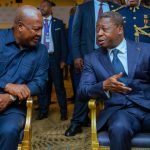A Chinese spacecraft carrying a three-person crew, which includes the nation’s first female space engineer, has successfully docked after a flight lasting over six hours.
The crew will use the indigenous space station as a base for six months, conducting experiments and performing spacewalks while Beijing gains experience and intelligence in preparation for its goal of landing someone on the Moon by 2030.

Beijing has declared the launch of Shenzhou 19 a “complete success” and plans 100 launches in a record year of space exploration as it aims to surpass its main rival, the United States.
The BBC received rare access to the Jiuquan Satellite Launch Center in Gansu, witnessing the spacecraft launch from over a kilometer away as flames erupted from the rocket, lighting up the Gobi Desert with a thunderous roar.
Hundreds gathered to wave and cheer for the taikonauts, the term used in China for astronauts, as they embarked on their journey.
At the Tiangong space station, the Shenzhou 19 crew met three other astronauts from the Shenzhou 18 mission, who are scheduled to return to Earth on November 4.
Just two years ago, President Xi Jinping proclaimed that “exploring the vast cosmos, developing the space industry, and establishing China as a space power is our eternal dream.”

However, some officials in Washington perceive this ambition and rapid progress as a significant threat. Earlier this year, NASA Administrator Bill Nelson stated that the US and China are “in effect, in a race” to return to the Moon, where he suspects Beijing intends to assert territorial claims.
In Dongfeng Space City, a town built to support the launch facility, China’s space program is celebrated with national flags on every streetlight and astronaut figurines adorning children’s parks.
As the launch approached, hundreds gathered in the early hours, waving flags and cheering as the taikonauts made their final steps on Earth before heading to the launch site.
A brass band played “Ode to the Motherland,” with children, faces painted with the Chinese flag, singing along.
Pilot Cai Xuzhe, a veteran of the mission, is joined by a new generation of taikonauts born in the 1990s, including Wang Haoze, China’s first female space engineer.
“Their youthful energy makes me feel younger and more confident,” he told the media before takeoff. He expressed commitment to achieving new milestones in China’s crewed space program, inspired by dreams that ignite glory.
Standing next to him, Song Lingdong recalled watching one of China’s first space station missions at the age of 13, feeling “excitement and awe.” He pursued a career as a pilot to serve his country. All three astronauts conveyed a profound sense of national pride, with state media emphasizing that this is the “youngest crew” in China’s history.
China has already selected the next group of astronauts for training in potential lunar missions and to operate the space station. Song vowed not to betray the trust placed in him, aiming to ensure China’s name shines in space once more.

China’s recent accomplishments in space have been notable. Earlier this year, it achieved a historic first by retrieving rock and soil samples from the far side of the Moon.
In 2021, it successfully landed a spacecraft on Mars, deploying its Zhurong rover and becoming only the second nation to do so.
Additionally, China has launched a fleet of satellites and plans to deploy a constellation of 14,000 satellites to provide broadband internet coverage, which aims to compete with SpaceX’s Starlink.
Elon Musk has acknowledged that China’s space program is more advanced than many realize. However, concerns persist in the US about potential weaponization of this technology.
General Stephen Whiting, head of US Space Command, noted that both China and Russia are investing heavily in space at an unprecedented pace, claiming that since 2018, China has tripled its intelligence, surveillance, and reconnaissance satellites in orbit, creating a “kill web” over the Pacific to monitor US military capabilities.
Li Yingliang, director of the general technology bureau of China’s Manned Space Agency, framed China’s exploration as a “collective mission for humanity,” downplaying US fears as “unnecessary.”
He emphasized that China maintains a peaceful approach to space and intends to promote international cooperation in manned space technology.
However, the new space race transcends merely reaching the Moon; it is increasingly about who will control its resources.
The Moon holds valuable minerals, including rare earths, iron, titanium, and helium, with potential estimates of their worth ranging from billions to trillions.
This prospect explains why some view the Moon as a lucrative target, though extracting and returning lunar resources will require significant technological advancements.
Chinese experts at the launch center highlighted the benefits of experiments conducted at Beijing’s space station, which include research on bones, muscles, and nerve cells in microgravity.
Zhang Wei from the Chinese Academy of Sciences noted that findings related to osteoporosis on Earth bear similarities to bone loss in space, which may lead to new medications for combating these issues.
At times, China attempts to temper its achievements. During a recent roadmap launch for its space ambitions, which include establishing a research station on the Moon, returning samples from Venus, and executing over 30 space missions by mid-century, Ding Chibiao from the Chinese Academy of Sciences remarked that the country has fewer accomplishments compared to developed nations.
Even at the launch center, officials acknowledge the “significant challenges” that lie ahead in landing a crew on the Moon. “The technology is complex, the schedule is tight, and we face numerous challenges,” said Lin Xiqiang, spokesperson for the China Manned Space Agency.
“We will uphold the spirit of ‘two bombs and one star,’ maintaining self-confidence and a commitment to improvement as we strive to realize the Chinese people’s dream of landing on the Moon in the near future.”
This emphasis on the space program comes amid an economic slowdown in China, with President Xi prioritizing space initiatives.
Despite efforts to provide international media with insight into their progress, strict security measures were in place.
Journalists were kept at a hotel three hours from the launch site and shuttled back and forth by bus, with significant restrictions on local interactions.
The launch center’s signage conveyed a stern message: “It’s a crime to leak secrets. It’s an honor to keep secrets. You’ll be jailed if you leak secrets. You’ll be happy if you keep secrets. You’ll be shot if you sell secrets.” China is taking no chances with its advancements as its rivalry with the United States expands beyond Earth.
The two most powerful nations in the world may soon be making territorial claims beyond our planet.
























































![[FREE FREE MONEY] Predict and Win a Guaranteed GH¢200 From Us EVERY WEEK](https://wordpress.ghanatalksradio.com/wp-content/uploads/2022/02/Predict-and-Win-Final-09-03-2021-218x150.jpg)
![[Predict & Win – 8th/Oct.] WIN A Guaranteed ¢200 From Us This Week](https://wordpress.ghanatalksradio.com/wp-content/uploads/2021/10/maxresdefault-16-218x150.jpg)
![[Predict & Win – 2nd] WIN A Guaranteed ¢200 From Us This Week](https://wordpress.ghanatalksradio.com/wp-content/uploads/2021/09/maxresdefault-50-218x150.jpg)
![[Predict & Win – 25th] WIN A Guaranteed ¢200 From Us This Week](https://wordpress.ghanatalksradio.com/wp-content/uploads/2021/09/maxresdefault-36-218x150.jpg)
![[Predict & Win – 18th] WIN A Guaranteed ¢200 From Us This Week](https://wordpress.ghanatalksradio.com/wp-content/uploads/2021/09/maxresdefault-23-218x150.jpg)







![[National cathedral] See full list of churches that have contributed since 2018](https://wordpress.ghanatalksradio.com/wp-content/uploads/2020/09/Ghana-National-Cathedral-GhanaTalksRadio-100x70.jpg)



